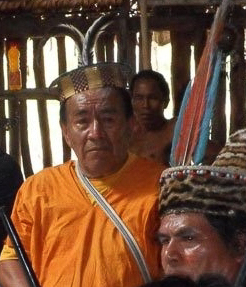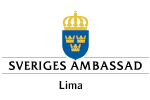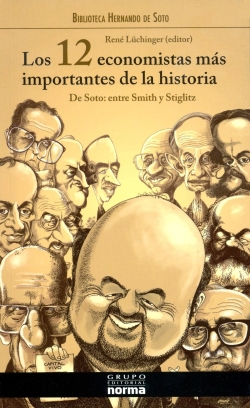 Features April 28, 2011
Features April 28, 2011
Renowned Peruvian economist Hernando de Soto argues that the financial crisis wasn't just about finance—it was about a staggering lack of knowledge
By Hernando de Soto
During the second half of the 19th century, the world's biggest economies endured a series of brutal recessions. At the time, most forms of reliable economic knowledge were organized within feudal, patrimonial, and tribal relationships. If you wanted to know who owned land or owed a debt, it was a fact recorded locally—and most likely shielded from outsiders. At the same time, the world was expanding. Travel between cities and countries became more common and global trade increased. The result was a huge rift between the old, fragmented social order and the needs of a rising, globalizing market economy.
Read more ...
 The ILD, in particular our leaders and researchers who had the good fortune to meet and work closely with don Miqueas MIshari Mofat, were saddened to hear of his passing yesterday. He helped found and advance indigenous causes in Peru and Latin America. A historical leader of the Ashaninka people’s struggles, and founder of AIDESEP (the National Organization of the Amazon Indigenous Peoples of Peru), don Miqueas, continued right to the end, his search for a solution to the economic and social marginalization of the indigenous citizens of the Peruvian Amazon. Since the violent events in Bagua, over two years ago which left 34 dead, don Miqueas approached our institute to seek an ally in this complex struggle. He shared his experience and his vision on the destiny of the indigenous peoples of the Amazon. He found common ground in his untiring search for alternatives to the marginalization of our native brothers and sisters; and for concrete and viable solutions for economic integration, without sacrificing traditions and cultures. Don Miqueas´ legacy will live on in the pursuit of lasting change. He will be missed.
The ILD, in particular our leaders and researchers who had the good fortune to meet and work closely with don Miqueas MIshari Mofat, were saddened to hear of his passing yesterday. He helped found and advance indigenous causes in Peru and Latin America. A historical leader of the Ashaninka people’s struggles, and founder of AIDESEP (the National Organization of the Amazon Indigenous Peoples of Peru), don Miqueas, continued right to the end, his search for a solution to the economic and social marginalization of the indigenous citizens of the Peruvian Amazon. Since the violent events in Bagua, over two years ago which left 34 dead, don Miqueas approached our institute to seek an ally in this complex struggle. He shared his experience and his vision on the destiny of the indigenous peoples of the Amazon. He found common ground in his untiring search for alternatives to the marginalization of our native brothers and sisters; and for concrete and viable solutions for economic integration, without sacrificing traditions and cultures. Don Miqueas´ legacy will live on in the pursuit of lasting change. He will be missed.
Read more ...
![]() November 8, 2011 | By Hernando de Soto
November 8, 2011 | By Hernando de Soto



 05 October 2011 - A meeting was held on 5th October 2011 in New Delhi between Union Minister for Housing & Urban Poverty Alleviation (HUPA) and Culture Kumari Selja and Mr. Hernando de Soto, Peruvian Economist and President, Institute of Liberty and Democracy (ILD), Peru to discuss a project focusing on the legal empowerment of the poor in India. Also present at the meeting were Shri Arun Kumar Misra, Secretary, HUPA, His Excellency, Mr. Javier Paulinich, Ambassador of Peru to India and Mr. Luis Triveño, CEO, ILD.
05 October 2011 - A meeting was held on 5th October 2011 in New Delhi between Union Minister for Housing & Urban Poverty Alleviation (HUPA) and Culture Kumari Selja and Mr. Hernando de Soto, Peruvian Economist and President, Institute of Liberty and Democracy (ILD), Peru to discuss a project focusing on the legal empowerment of the poor in India. Also present at the meeting were Shri Arun Kumar Misra, Secretary, HUPA, His Excellency, Mr. Javier Paulinich, Ambassador of Peru to India and Mr. Luis Triveño, CEO, ILD.


 The ILD, in particular our leaders and researchers who had the good fortune to meet and work closely with don Miqueas MIshari Mofat, were saddened to hear of his passing yesterday. He helped found and advance indigenous causes in Peru and Latin America. A historical leader of the Ashaninka people’s struggles, and founder of AIDESEP (the National Organization of the Amazon Indigenous Peoples of Peru), don Miqueas, continued right to the end, his search for a solution to the economic and social marginalization of the indigenous citizens of the Peruvian Amazon. Since the violent events in Bagua, over two years ago which left 34 dead, don Miqueas approached our institute to seek an ally in this complex struggle. He shared his experience and his vision on the destiny of the indigenous peoples of the Amazon. He found common ground in his untiring search for alternatives to the marginalization of our native brothers and sisters; and for concrete and viable solutions for economic integration, without sacrificing traditions and cultures. Don Miqueas´ legacy will live on in the pursuit of lasting change. He will be missed.
The ILD, in particular our leaders and researchers who had the good fortune to meet and work closely with don Miqueas MIshari Mofat, were saddened to hear of his passing yesterday. He helped found and advance indigenous causes in Peru and Latin America. A historical leader of the Ashaninka people’s struggles, and founder of AIDESEP (the National Organization of the Amazon Indigenous Peoples of Peru), don Miqueas, continued right to the end, his search for a solution to the economic and social marginalization of the indigenous citizens of the Peruvian Amazon. Since the violent events in Bagua, over two years ago which left 34 dead, don Miqueas approached our institute to seek an ally in this complex struggle. He shared his experience and his vision on the destiny of the indigenous peoples of the Amazon. He found common ground in his untiring search for alternatives to the marginalization of our native brothers and sisters; and for concrete and viable solutions for economic integration, without sacrificing traditions and cultures. Don Miqueas´ legacy will live on in the pursuit of lasting change. He will be missed.

 Just before the traditional military parade of the 29th of July began, an apparently secondary event took place: approximately one hundred men, women, senior citizens and children clashed with the police and military to force their way into the stands set up at the edge of Brazil Avenue to watch the parade.
Just before the traditional military parade of the 29th of July began, an apparently secondary event took place: approximately one hundred men, women, senior citizens and children clashed with the police and military to force their way into the stands set up at the edge of Brazil Avenue to watch the parade.